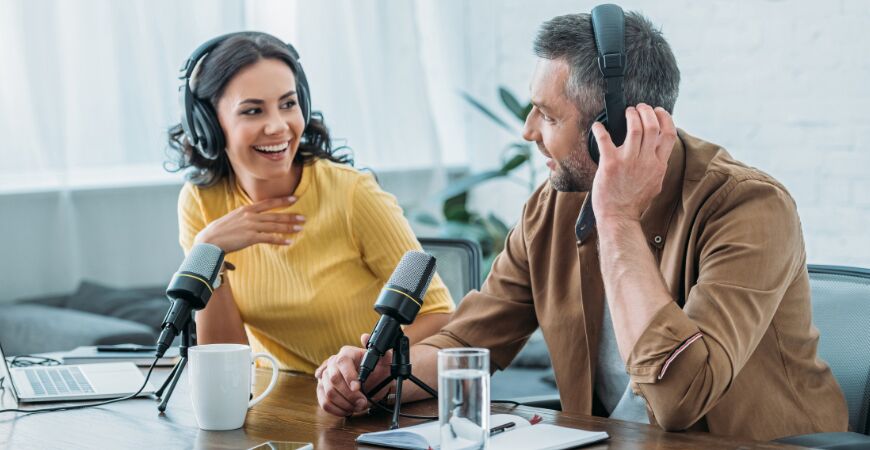

Wed 22 / 03 / 23
Podcasting - everything you need to know to get started
Thinking about starting a podcast, but not sure where to begin? Peter Middleton from Hart Essence shares the top five things you need to know for podcasting.
By Peter Middleton of
Podcasting is a powerful medium in today’s world; translating wisdom and knowledge into engaging conversation, across a global audience.
Starting out on the journey of creating a podcast can be a daunting task, so if it’s something you’re thinking about starting, here’s a breakdown of the key steps, so that you can feel more calm and creative about your project.
Pre-production
Pre-production sets you up for what’s to come. To have a clear and concise exploration of the concept, timings, technical requirements, and delivery aspects of the project might be a bit more work to begin with, but in the long run, it frees up time and gives you reference if things get challenging. If you need to be flexible, then you’ll also have a better understanding of what you’re diverging from.
Getting pre-production right is a game changer because direction and structure allows you to align to the right decisions when things get frantic or stressful.
The key aspect of this stage is to answer two questions:
- Who is your ideal client/listener?
- What is the key message you want to translate to this client/listener?
Podcasting is all about telling a story.
Whether it be a personal story, a purposeful mission, or the story of a useful product.
Scripting is an important aspect of the pre-production stage. Knowing your ideal client/listener is important to knowing which language you would like to use and where, and this allows you to be more authentic for yourself too!
Generally, there are three sections to a podcast:
1. Intro
2. Main content
3. Outro
The intro is an opportunity to show the value of your podcast to new listeners, and to welcome the members of your growing community back to another edition. It’s great to have some unique music, and to make sure it is edited so the voice and music are smooth and pleasing to the ear.
The main content can be formatted however you choose - remember to keep it simple and stay on your key message.
The outro is an opportunity to thank people for spending their precious time with you, inform them of what products or services you have and to sign off with a personal message. And, bringing back the same intro audio in the outro will give the listeners a sense of familiarity and help you to create a coherent vibe for your podcast.
Technicalities
In the modern world, where people’s attention spans are short, there’s a greater need to get your technicalities well executed.
Great audio will attract listeners, and you need people to engage in your intro at least, so that they can then decide if the podcast message resonates with them.
The practicality of this includes getting the right equipment to record professionally, either at home or in a professional studio. The right microphone will suit your voice; change the tone of your recording; can make you sound more authoritative about your subject.
Making sure the environment is quiet is paramount, there’s nothing more distracting than out of context noises, especially in business podcasting.
Post-production
This can really give you the edge in podcasting. Getting a trained audio specialist to mix and master the audio to broadcast standard.
Some other things to think about: do you want to include full length video to Youtube, or video clips on social media?
You’ll either need an editing software like a Digital Audio Workstation, or Adobe Audition, or you’ll need to outsource this.
Guests
From the pre-production conceptual work, you can then begin to develop an understanding of who is working in this space - who talks around those concepts already, who has value to give, and what value you specifically want to translate.
Having conversations with guests before the recording day is advisable, so you can be sure that they have the recording equipment that they need for a good standard, if you’re recording remotely on a call, or at home.
It is also a really good chance to drop in and align on topics of interest, and developing an exciting anticipation of the recording, which will translate in the good will of the conversation.
Distribution
You can have a really special podcast and fall at this last hurdle. As I mentioned earlier, the modern world is full of short attentions, and a lot of noise. This is why it’s important to get your distribution right.
Considering what distribution platform is best for you is paramount.
Where is your target audience and where should you be releasing the podcast?
Will it include audio only, or are you including visuals?
Perhaps the most useful tool in the distribution world is analytics, to get a gauge of who is downloading and listening to the podcast, what demographic you’re reaching and how far they are listening into the episodes.
So, ready to get started?
Hopefully this has helped you to gain some insights into what it might look like to create, record and distribute your own podcast. Take the small steps and align to the two main questions of the pre-production stage.
Peter Middleton is Founder of Hart Essence, a company dedicated to facilitating soulful expression. He works in podcasting, coaching, audio and writing sphere to communicate messages effectively and authentically, with hart.
Find out more on his website here.
If you want to contribute to the Chamber blog, contact us on hannah@brightonchamber.co.uk



